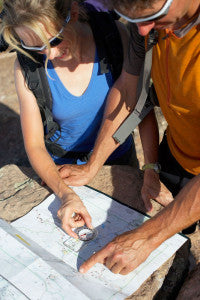We’ve all done it… bought crappy gear because it was cheap, marketed well, or we got emotional and made an impulse buy. To help out, here are 14 ways to get the perfect gear, every time.

Start Small - Getting started in emergency preparedness and survival stuff can be overwhelming and can leave you stone cold broke. So start small. A great survival book or two, a knife, and a well thought out general survival and first aid kit are all good first steps. And writing out a simple survival plan will cost you nothing… except a bit of time.

Focus - Focus on the most likely situation you may face. For instance: Most of us should prepare for a power outage, vehicle break down, or loss of income. Survival provisions can help you get through lean personal financial times.

Learn to Improvise - Developing the skills to turn something of no value (or that is designed for a different purpose) into something of value - especially in a survival situation - is a vital skill.

Learn to Bargain Hunt - Surplus food stores, Second-hand shops, Yard sales, Ebay, Craig’s list. This is always, a time vs. money trade. It will take some time to find a deal, but you might save some big money.

Versatility - Can each item be used for multiple tasks? Or is its primary task vital enough to justify it’s singular purpose? A quality poncho is a good example, since I can be used for a shelter, rain gear, ground tarp, water collector and a host of other uses. Killing two, three, or four "birds” with one stone will save weight, money, and increase your survivability.

Necessity / Priority - Ask yourself, “Does this item help satisfy a key priority of survival?” Meaning: is it really necessary? Or is it a luxury or optional item? Build your survival stash focusing on the disciplined acquisition of essential items first.

Resist Impulse Buys - It’s hard, but try to limit impulse buys. Here’s a simple tip… Give yourself 10 days before you make a big purchase. It’s also not a bad idea to talk over significant purchases with your spouse, parent or significant “other” to make the best decision, foster peace, and keep everyone on the same page.

Durability - Ask, “Will this item last long and survive rough use?” As for me, I’ve learned my lessons. I’ll almost always pay more for proven reliability, quality and relevant craftsmanship that results in a better product… especially when I’m investing in key items such as a knife, water filter, or rucksack.

Cost / Affordability - Cost is VITAL but is relative to every person and their budget. Weigh all factors against cost to make the best decision for you. Honestly, sometimes I just have to slow down and save my pennies to get the piece of gear I really need.

Weight - Weight is important for anything you have to carry or transport. Not AS important if you don’t plan to mobilize. But keeping weight down gives you options and more versatility in the event that you do need to be mobile or carry stuff on your back.

Volume / Size - Volume can be as important as weight if you have to hit the road. We each only have so much room in a backpack, vehicle or home.

Reviews / Recommendations - Select tried and true gear with good reviews and helpful user comments. The more reviews the better. Talk to people you trust and ask what they recommend. This reduces overall risk and the potential of you wasting your money. If you haven't, you may find some of our YouTube gear reviews to be helpful.

INVEST the Best Gear You Can Afford - In my perspective, good gear is an investment NOT an expense. Plus it may have the added value of being an essential barter item in tough times. We all have a choice to make, purchase great gear and have it last for a long time… or cut corners and purchase cheaper stuff and risk having it break, fail or wear out when it’s needed most.

Get Trained - In our way too busy lives, it seems like we are all looking for short cuts. And gear can be a short cut that’s gives a false sense of security, especially when it’s purchased devoid of knowledge, training and skill. Since knowledge weights nothing (to carry) costs a minimal amount to acquire (in dollars and time), and never wears out or breaks, I recommend that EVERYONE invest in a quality, yearly training that interests you. For instance wife, she loves wild plants, and how to use them medicinally. So we invest in books, online and “live” training for her. Last year she also attended our Ultimate Survival Tips - LEVEL 1 Training to gain basic survival skills. There are many basic survival, tactical, preparedness, books, and course available. Find one that suits your interests, needs, budget. If you would like a comprehensive, condensed training in a wide diversity wilderness and urban survival skills, our Ultimate Survival Challenge - LEVEL 1 is the only affordable, family-friendly training in the USA that covers everything from primitive and urban survival skills to basic navigation, first aid, personal hand-to-hand self defense and a ton more - all in a condensed, 3-day format.



















Leave a comment